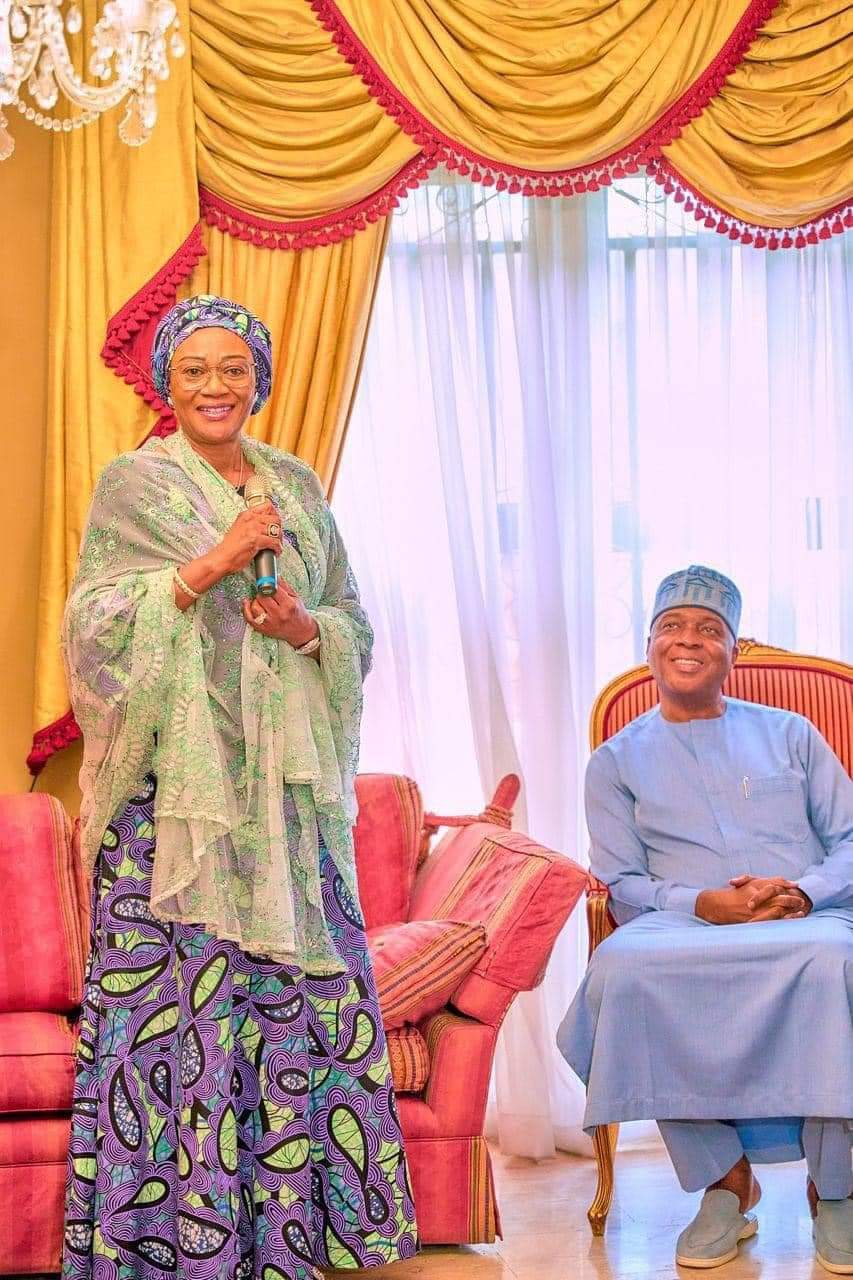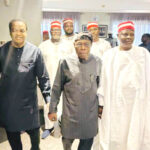By Keem Abdul
Sometimes it takes a reminder of our mortality to reinforce our understanding that beyond our petty differences and temporal allegiances, we are essentially one and the same, bound together by the ebbs and flows of our common humanity.
True to her growing reputation as a sturdy and calm bridge over the troubled waters that Nigerian politics has always been, the country’s First Lady, Senator Oluremi Tinubu, demonstrated that understanding – and reinforced her credentials as a uniter rather than a divider – when she paid a visit to the home of the former President of the Nigerian Senate, Dr. Bukola Saraki, to express her sympathies and those of President Bola Ahmed Tinubu on the recent passing of the Saraki family matriarch, Mrs. Florence Morenike Saraki. Tinubu described her visit (which, she says, has the full endorsement of the President) as her way of assuring the Sarakis that they’re loved and far from alone at this somber period.
“We are one family,” Mrs. Tinubu said on her arrival at the Sarakis’ Lagos residence. “You know that politics aside, Mr. President will always look out for you.”
The First Lady went on to pay tribute to the legacy of the late matriarch, saying that though the pain of losing a loved one is undeniable no matter the age of the deceased, the Sarakis can take pride and derive consolation from the fact that the late Mama Florence Saraki lived a good and exemplary life. It is a legacy, she added, for which the late matriarch’s offspring and extended family should be grateful.
- I’ll adhere to S/Court ruling on LG autonomy – Katsina gov
- We’ll appeal $220m fine by FCCPC – Meta
Apart from being a show of solidarity by the Tinubus, the First Lady went on to say, her visit was also a personal show of appreciation to the President of the 8th Senate, Dr. Saraki, who, she said, was always in her support during their time together at the upper legislative chamber.
The former Senate President, who also served at one time as a two-term Governor of Kwara State, was visibly gratified at the presence of the First Lady in his family home. Far from being surprised at her visit, he said in response to his former colleague’s message of condolence, he was all-too-familiar with her passionate and caring nature. “You see the bigger picture all the time,” he told Sen. Tinubu. “I know you are … full of compassion.”
Sen. Saraki is right about Mrs. Tinubu’s essential character – and he is by no means the only public figure to make that observation. In fact, the First Lady’s use of the phrase, ‘… politics aside … ‘ speaks volumes in that regard. In some other clime, perhaps, where political discourse and electioneering campaigns are contests of ideas and ideologies, with various political factions offering an enlightened and engaged electorate their contrasting visions for the management and direction of the economy, security and society in general (rather than a clash of weapons punctuated by crude campaigns of calumny, a theatre of competing ethno-centric and religious grievances and conflicting narratives of entitlement), a visit like this would not merit any attention or comment. But in Nigeria, where the politics of identity and stereotyping (whether on the basis of ethnicity or religion) is at its most acute, such gestures as that of Sen. Remi Tinubu, are worthy of note and commendation. She is, after all, the wife of a President who is also the national leader of the ruling All Progressives’ Congress (APC) and herself a former Senator on the platform of that party, while Dr. Saraki is of the opposition People’s Democratic Party (PDP), who has often been at odds with the APC in the course of his political career.
Mrs. Tinubu’s gesture speaks to the need – nay, the urgent imperative – of engendering a culture of bipartisanship (especially among the ruling class) and a politics of higher purpose in the quest to minimize the prospect of physical conflict that can endanger the polity. Nigeria is, arguably, more divided now at any other time in its post-colonial history since the end of the 1967-70 Civil War. The nihilistic regime of former President Muhammadu Buhari (which was marked by blatant nepotism and clear violations of protocols designed to create in all sections of the country a sense of national belonging) and the events before, during and after the 2023 General Elections, did not do much to change that dreary picture, so much so that it seemed, at times, as if the nation was heading inexorably on the path of disintegration.
But thanks to people like Sen. Oluremi Tinubu, the prospect of disintegration no longer seems as inevitable as it did only a year or so ago. Her gestures, like her condolence visit to the family of a key opposition figure, might seem like a drop in the proverbial ocean of disunity and mutual distrust, but as we have been reminded at different times in history, progress sometimes takes just one person who is determined to make a difference.
Mrs. Tinubu is one such person.
The importance of bipartisanship in a diverse and often fractious polity such as Nigeria cannot be over-emphasized. Indeed, political analysts say it is indispensable to the quest for, and practice of, good governance in a democracy. Sometimes referred to as non-partisanship, bipartisanship is a political situation in which opposing political parties actively find common ground through dialogue and compromise. It is the opposite of partisanship, where members of a political party seek to pursue only its interests, without compromise. Failure to attain bipartisan support in such a democracy system can easily lead to gridlock (especially when it comes to enacting legislation or implementing a policy) and an overheating of the polity, which, if left unchecked, can lead to outright conflict.
Mrs. Tinubu’s gesture, and her initiatives since her husband became the President of Nigeria, are also a reminder that in spite of its ethnic and cultural diversity, there is NO need for Nigeria to be this divided. True, certain leaders and key stakeholders have, since independence, made deliberate attempts to knit a cohesive nation from this legacy of division. These measures have included power sharing arrangements and quota systems, the National Youth Service Corps, as well as occasions for the vibrant expressions of our rich cultural heritage through festivals of art, food, sports, and literature.
But there have been many, many missed opportunities to achieve true and lasting unity, no thanks to gross leadership failures on the part of successive Nigerian governments. Like most of post-colonial Africa, the entity called Nigeria was crafted out of disparate cultures – many of them at odds with one another. Independence promised a new Nigeria that would benefit all Nigerians. Unfortunately, the Nigerian leaders who took over from the British wasted the opportunities offered by the gains of independence to dismantle the inherited colonial fissures of their societies. They fell into the pitfall of the nation being passed over for the race, and the tribe being preferred to the state. The consequences were disastrous: a series of coups, counter-coups and conflicts, and then the civil war of in which almost 2 million people died.
But in the years since the war, ordinary Nigerians of all backgrounds are the ones shaping their country’s future through everyday expressions of nationhood. Nigerians are intermarrying in ever-increasing numbers. They’re doing business together. And they often express a general sense of pride and unity in the country’s food, sports, music and movies.
It is time for the leaders and political gladiators of this country to complement the actions and attitudes of ordinary citizens with similar actions and attitudes. It is of the utmost importance if we’re to reposition our country for development and greatness. This they can do through a deliberate programme of political renaissance, social integration, religious tolerance, economic restructuring, as well as cultural and ethical rebirth. We need a new orientation in leadership that will refocus our concentration on what unites us as Nigerians, rather than what divides us.
Fortunately, we have a leader who’s already showing the way, with small but incremental acts of compassion – which belie a fierce passion for the unity of this country and the welfare of ALL its people.
For Senator Oluremi Tinubu, it doesn’t necessarily take a death in the family to remind her of our common humanity. This understanding is ingrained in her – and it goes beyond politics.
Keem Abdul, publisher and writer, hails from Lagos. He can be reached via +2348038795377 or [email protected]

 Join Daily Trust WhatsApp Community For Quick Access To News and Happenings Around You.
Join Daily Trust WhatsApp Community For Quick Access To News and Happenings Around You.


